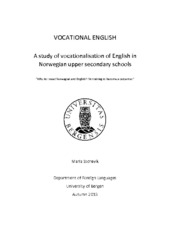| dc.description.abstract | This is a master thesis on the topic of vocationalisation of the common core subject of English in the vocational classroom. The aim is to learn about the opinions of the teachers through a qualitative approach and the voice of the pupils through a quantitative approach, and thus get a broader perspective on the phenomenon at hand. Through a qualitative approach with interviews, the teachers' views and reported practice of vocationalisation is enquired after. However, in order to arrive at a broader understanding of the implementation of vocationalisation, the pupils' point of views also have to be investigated. Therefore, to find several pupils' opinions, a smaller and quantitative component is added to the research, giving this study a mixed methods approach. The empirical material comprises of four qualitative interviews of teachers who all teach English within either Building and Construction, or Health and Social Care. In addition 35 pupil informants have filled out a questionnaire about the teaching of English in general and of vocationalisation in particular. In order to put the phenomenon of vocationalisation into perspective, the thesis gives a brief historical overview of vocational education in Norway and the development of English language teaching in the vocational classroom. In addition there is a comparison of vocational education in Norway versus Europe. Theories on motivation, vocationalisation and the implementation of government initiatives such as New Possibilities and FYR (translated: Common Core Subjects, vocationalisation and relevance) are also important to bring to light. One interesting result is the indication that the teachers have different views on to how vocationalisation should be carried out. While some have a compartmentalised view, teaching vocation-specific components or collaborating in interdisciplinary projects, others hold that vocationalisation should be a part of the everyday teaching in the vocational English classroom. | en_US |
